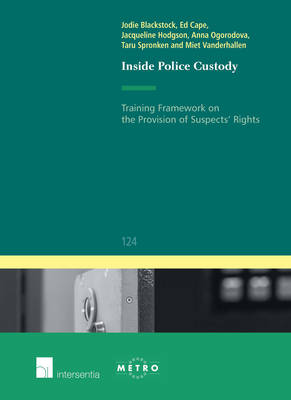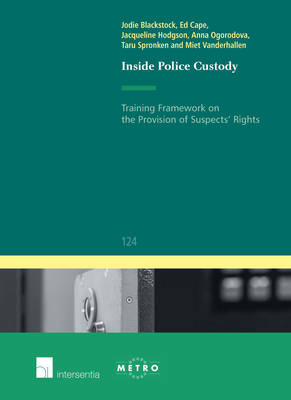
- Retrait gratuit dans votre magasin Club
- 7.000.000 titres dans notre catalogue
- Payer en toute sécurité
- Toujours un magasin près de chez vous
- Retrait gratuit dans votre magasin Club
- 7.000.0000 titres dans notre catalogue
- Payer en toute sécurité
- Toujours un magasin près de chez vous
Inside Police Custody
Training Framework on the Provisions of Suspects' Rights Volume 124
Taru Spronken, Jodie Blackstock, Edward Lloyd-Cape, Jacqueline Hodgson, Anna Ogorodova, Miet Vanderhallen
32,45 €
+ 64 points
Description
This training framework guide is based on the empirical study of the procedural rights of suspects in four EU jurisdictions - England/Wales, France, the Netherlands, and Scotland - conducted in the period of 2011-2013. The study focused on three of the procedural rights set out in the EU Roadmap for strengthening the procedural rights of suspected and accused persons in criminal proceedings: the right to interpretation and translation, the right to information and the letter of rights, and the right of access to a lawyer before and during police interrogation, as well as the right to silence. The results have been published in the book Inside Police Custody: An Empirical Account of Suspects' Rights in Four Jurisdictions [ISBN 978 1 78068 157 3]. The objective of the training framework is to enhance the knowledge, understanding, and skills of criminal justice practitioners - police officers and defense lawyers - in respect of the procedural rights of suspects in police detention. It does this by orientating the framework around the requirements of EU law on procedural rights and by suggesting appropriate training strategies. The framework incorporates best-practice identified during the observational stage of the research study, and is designed to be applicable across EU Member States. Since training courses for police officers and lawyers rarely focus exclusively on the procedural rights of suspects, the training framework is not intended to provide a model for stand-alone training. Building on the findings of the research, as well as the pilot training program carried out as part of the research project, the training framework is designed as a tool to be used in the planning of training programs on the procedural aspects of police custody, for both police officers and lawyers. In this regard, the book highlights the procedural rights to be addressed through training, as well as the training methods that may be suitable for ensuring their effective delivery in practice. (Series: Ius Commune Europaeum - Vol. 124)
Spécifications
Parties prenantes
- Auteur(s) :
- Editeur:
Contenu
- Nombre de pages :
- 59
- Langue:
- Anglais
- Collection :
Caractéristiques
- EAN:
- 9781780681863
- Date de parution :
- 05-12-13
- Format:
- Livre broché
- Format numérique:
- Trade paperback (VS)
- Dimensions :
- 170 mm x 240 mm
- Poids :
- 131 g

Les avis
Nous publions uniquement les avis qui respectent les conditions requises. Consultez nos conditions pour les avis.






